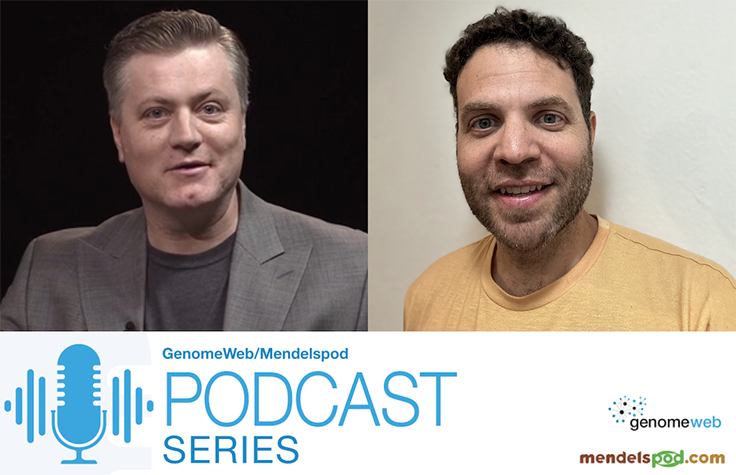
5 March 2024
The podcast Mendelspod covers the latest developments in biotech and precision medicine. For 13 seasons and more than 10 years, host Theral Timpson has conducted longform interviews with scientists, executives, and journalists about the biggest ideas and newest technology driving these fields.
Illumina is proud to share that, in partnership with GenomeWeb, one of our associate principal scientists, Samuel Strom, appeared as Timpson’s guest on the most recent episode. Click here to listen to the episode, “Illumina Scales Variant Calling and Genome Interpretation to Improve Gap in Genetic Testing.”
Strom is a certified clinical lab director, fellow of the American College of Medical Genetics and Genomics (ACMG), and diplomate of the American Board of Medical Genetics. He traces his interest in whole-genome sequencing as a clinical laboratory service back to when he was earning his PhD in human genetics at UCLA’s David Geffen School of Medicine. His lab group was one of only a few in the country validating clinical exome sequencing at the time, and it sparked him to ask, “How do we turn all of these sequence results into something that can impact families?”
He started his career as a laboratory director at Fulgent Genetics, and has been with Illumina now for two years. In addition to his contributions to papers in Science, Genetics in Medicine, Molecular Psychiatry, and others, he’s a regular author of articles for Illumina’s Genomics Research Hub, some of which are linked to below.
Advances in variant calling
In the interview, Timpson asks why genetic variants are so difficult for sequencers to detect, or “call.” Strom explains that for years, “we’ve just been pushing out the boundaries with what short-read technology can do as far as we can go.” In the early days, sequencers looked only for small variants, like single-nucleotide polymorphisms—but now, Illumina DRAGEN software can use algorithms to detect much more complicated ones, like short tandem repeats. “It never even occurred to me that that would be possible,” he says.
He mentions two of the bioinformatics team’s recent successes creating targeted callers: for GBA1, a gene associated with Gaucher disease and Parkinson disease; and for HBA1 and HBA2, which are linked to alpha thalassemia, a blood hemoglobin deficiency and one of the most common genetic diseases in the world.
Strom also describes his colleagues’ efforts to build a multi-sample reference genome using samples from diverse populations. This reference, which he likens to a “3D version of a genome,” captures the probability of nonpathogenic general polymorphisms that are common among certain groups, which produces more accurate reads.
For example, he says, “If you have an indel in one part of the read and an SNV in another part of the read,” analysis software may simply assume that read was mapped poorly and discard it—“when in fact both of those things may be totally normal and present in 20% of people.”
Genomic AI
It seems like every field of study is looking into how it might benefit from artificial intelligence, and genomics is no different. Strom mentions that the latest version of DRAGEN, 4.2, uses machine learning to figure out what patterns of variant calling are associated with better accuracy scores. This feature has been integrated since version 3.9.3, and the Illumina Artificial Intelligence Lab and DRAGEN bioinformatics teams are working to integrate AI through the entire next-generation sequencing workflow.
Emedgene, a tertiary analysis solution available as part of Illumina Connected Software, also uses AI. When it prioritizes candidates from among all the variant calls for a given sample, it employs an AI analysis component trained to “pluck out the likely solving variants that are causing disease in that individual. […] It finds all the variants that we spend hours poring over the data trying to find.” This, combined with Emedgene’s integration capabilities for a complete, seamless workflow, enable a wide range of labs to save a substantial amount of time per analysis, in turn increasing the accessibility and scalability of research.
Genomics for all
Speaking about what interests him most in the medium- and long-term future of genomics, Strom emphasizes the need to make genetic testing easier and more available to a wider population—not just in big reference labs and academic medical centers, but smaller institutions and community hospitals. “The genomics workforce is not nearly big enough to handle all the genetic testing that should be done,” he says.
When asked why this is, he suggests a few possible reasons: One is a knowledge gap, as genetic counseling is seldom part of a standard medical school curriculum. Another is the reality of what it costs, and Timpson concurs—genetic testing solutions exist and are theoretically available, but reimbursement levels are often still unpredictable.
This combination of barriers influences Strom’s vision for what comes next in the clinical space: ensuring that the informatics tools used can achieve more accurate and comprehensive results, enabling thorough and rigorous validation and ultimately expanding access to genetic testing to those who need it most.
“We’re at the point where the technological capabilities are pretty far ahead of what everybody is actually able to get from their doctor,” he says. “So I think the next era is accessibility and integration: making it easier for health systems and hospitals and showing them that this is all possible now.”
To learn more about how one laboratory is leveraging DRAGEN and Emedgene, register to watch the exhibit theater presentation by Christine Eng, MD, on March 14 at the ACMG annual meeting.


